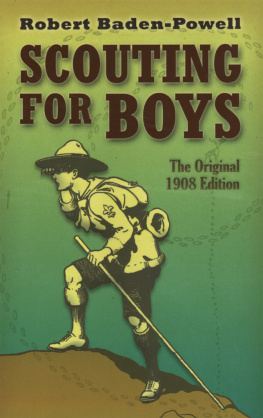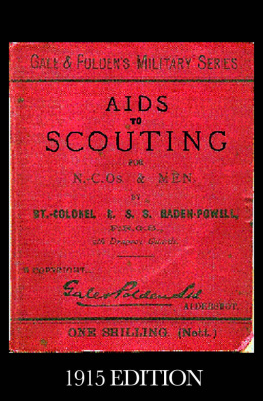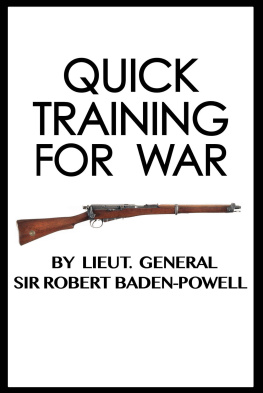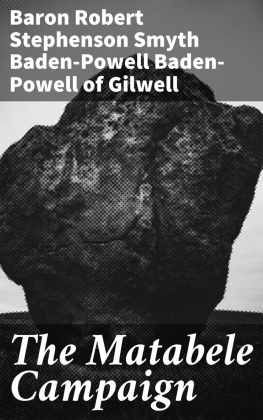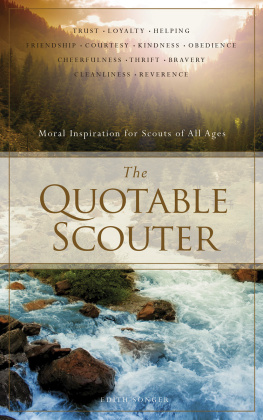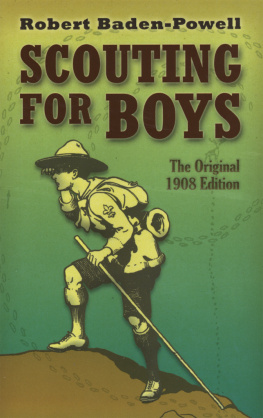SCOUTING FOR BOYS.

The Boy Scout in Action.
SCOUTING
FOR BOYS
The Original 1908 Edition
Robert Baden-Powell
DOVER PUBLICATIONS, INC.
Mineola, New York
Bibliographical Note
This Dover edition, first published in 2007, is an unabridged republication of Scouting for Boys: A Handbook for Instruction in Good Citizenship. Six parts, issued fortnightly, were originally published by Horace Cox, London, 1908.
Note: In the Books to Read section at the end of various chapters books marked with an asterisk are published by Dover Publications. Check our website, www.doverpublications.com. for price and availability.
Library of Congress Cataloging-in-Publication Data
Baden-Powell of Gilwell, Robert Stephenson Smyth Baden-Powell, Baron, 1857-1941.
Scouting for boys : the original 1908 edition / Robert Baden-Powell. p. cm.
Originally published: London : H. Cox, c1908.
Includes bibliographical references.
eISBN:13 978-0-486-31812-7
1. Boy Scouts. 2. CivicsStudy and teaching. I. Title.
HS3312.B34 2007
369.43dc22
2006052741
Manufactured in the United States by Courier Corporation
45719204
www.doverpublications.com
SCOUTING FOR BOYS.

CONTENTS OF THE PARTS.

SCOUTING FOR BOYS.

FOREWORD FOR INSTRUCTOR.
[N.B.Remarks printed in italics are, throughout the book, addressed to the Instructor.]
By the term Instructor I mean any man or lad who takes up the training of either a Patrol (i.e., six to eight boys), or a Troop i.e., (several Patrols joined together).
By means of this book I hope that anyone, even without previous knowledge of scouting, may be able to teach it to boysin town just as well as in the country.
The system is applicable to existing organisations such as schools, boys brigades, cadet corps, etc., or can supply a simple organisation of its own where these do not exist. But in all cases I would strongly commend the Patrol system : that is, small permanent groups, each under responsible charge of a leading boy, as the great step to success.
The reasons for this, the objects of the training and full hints to Instructors I have already published in a pamphlet called The Boy Scouts Scheme. Price Twopence. Published by Bradbury, Agnew, Bouverie Street, London, E. C. They will be further set forth in Part VI, of the present book.
I recommend the Instructor to begin with a Patrol of eight boys if possible, and when these have qualified as First-class Scouts to select the best five or six to raise each a patrol of his own and instruct it under his (the Instructors) supervision.
A great step is to obtain, if possible, a room, barn, or school to serve as a Club, especially for work on long winter evenings. It must be well-lit and warmed. And to have a camp-out in the summer.
There need be no great expense in working a troop of Boy Scouts.
Finance must largely depend on the efforts of the Scouts themselves. Methods for making money will be indicated in Part IV. I do not hold with begging for funds if it can possibly be avoided.
Any further information or advice will readily be given on application, and I shall be glad to have any-suggestions or informal reports of progress and numbers trained. But I have no desire to trouble Instructors with red-tape returns, and so on.
Scouts Badges, Medals, Patrol Flags, and Crests, Tracking Irons, and such articles of scouts equipment, can be obtained at low rates on application here.
All communications should be addressed, not to me by name, but to :
THE MANAGER,
Boy Scouts,
Goschen Buildings,
Henrietta Street,
London, E.C.
R. S. B.-P.
January, 1908.
PARTI.CONTENTS.

SCOUTCRAFT.
CAMP FIRE YARNS.
CHAPTER I.
SCOUTCRAFT.

NOTE FOR INSTRUCTOR.
The following is a suggestion for the distribution of the work for the first week. It is merely a suggestion and in no sense binding.
FIRST EVENING:
INDOORS.
Address the boys on Scoutcraft giving a summary of the whole scheme, as in this chapter, with demonstrations or lantern slides, etc.
Swear in the Scouts, form Patrols, and give shoulder knots.
FOLLOWING DAY;
MORNING AND AFTERNOON.
Practical work, outdoors if possible, as follows:
Alternatives according to whether in town or country, indoors or out.
MORNING.
Parade, hoist Union Fack and salute it.
Scouting game : e.g., Scout Meets Scout (See ).
Practise salutes, secret signs, patrol calls, scouts chorus, etc.
Practise drawing scout-signs on ground or walls with stick or chalk.
Tie knots.
Make ration bags, leather buttons, etc.
MORNING.
Parade. Prayers or Church Parade (if Sunday).
Physical Exercises.
Drill.
Self measurement by each scout of span, cubit, finger joint, stride, etc.
Send out scouts independently or in pairs to do a good turn to return and report how they have done it.
March out the Patrol to see the neighbourhood.
Make them note direction of starting by compass, wind, and sun.
Notice and question them on details seen, explain land marks etc.
Make Scouts Marks on ground or chalk them on pavement or walls.
Practise Scouts pace.
Judge distances.
AFTERNOON.
Play an extended Scouting Game. (See Games, p. 51).
Or indoors if wetJu-Jitsu Scouts War Dance Boxing, Scouts Chorus and Rally, etc.
EVENING.
Camp Fire Yarns from this book or from books recommended (see p. 19).
Or rehearse a Scout play, or hold Debate, Kims Game, etc.
Patrols to continue practice in these throughout the week in their own time or under the scout master, with final games or exercise on the following Saturday afternoon.
If more evenings than one are available in the week one of the subjects might be taken in turn more fully each evening, and rehearsals carried out of a display such as Pocahontas.
CAMP FIRE YARN.No. 1.

MAFEKING BOY SCOUTS.

WE had an example of how useful Boy Scouts can be on active service, when a corps of boys was formed in the defence of Mafeking, 1899-1900.
Mafeking, you may remember, was quite a small ordinary country town out on the open plains of South Africa.

